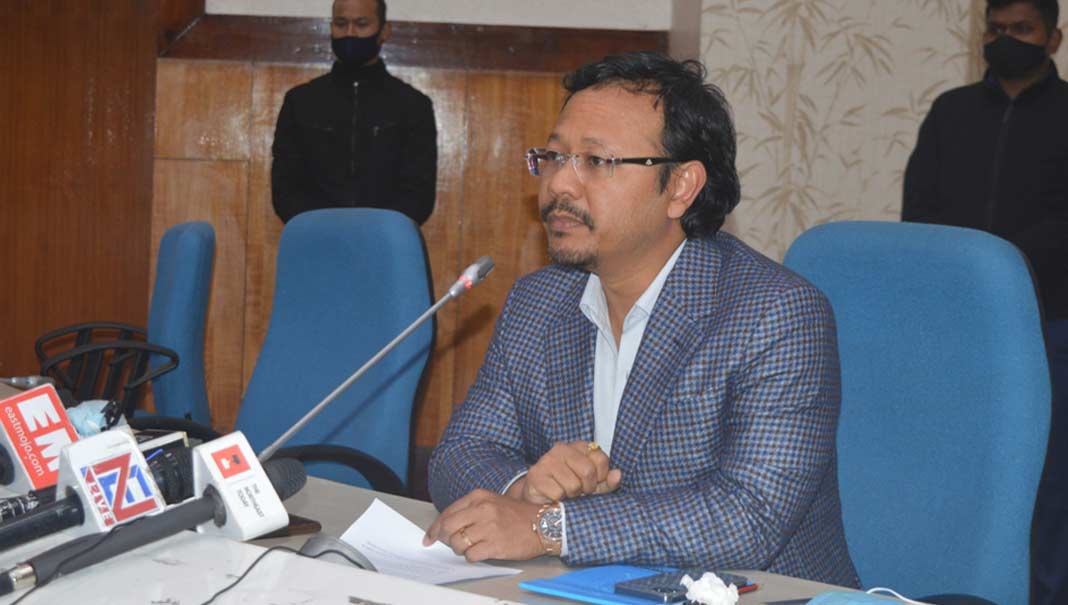Congress failed to implement Saubhagya scheme: James

Power Minister James K Sangma on Thursday said that the then Congress-led government has failed to bring the Saubhagya scheme for the people of the state.
Addressing a news conference to counter the allegations made by the opposition, Sangma told reporters that the pan-India scheme was launched by the central government when the Congress government was leading the state of Meghalaya.
“However, the Congress still did not bring it for the people of Meghalaya even though other states did,” he said while adding but the NPP-led government has successfully brought the Saubhagya scheme into the state immediately after it came to power.
He said under the Saubhagya scheme, 2,146 villages have been electrified in a record 1.5 years with all registered users covered under the scheme adding “This happened despite the stretched manpower due to the pandemic.”
On the allegation that two companies from outside the state were awarded the project at 51 percent above the schedule of rates (SoR), the minister said the two companies which were awarded the project took part in an online e-tendering process as per centre government guidelines.
“Companies quoted the lowest bid and were awarded the work only after due approval from the central government. All the prices quoted by the lowest bidders were verified by the central government agencies and after they approved the same, only then were the LOAs (Letter of Award) issued by the state government,” he said.
“Regarding the prices of few items as alleged by the Leader of Opposition Mukul Sangma, it should be noted that this was a turnkey contract, and the complete BOQ (Bill of Quality) was vetted and duly approved by central government agencies and experts,” he said.
About the 100 local contractors received contracts at the SoR, he said the SoR which the Congress repeatedly points out was designed by their government only back in 2014. The local contractors pitched to take up the work at those SoRs. Therefore, they were awarded projects accordingly, he added.
Stating that the Congress has failed to keep its promise to complete the Ganol project by February 2018, the minister said, “Why they failed is necessary to be cited. The geological study of the project site, conducted while Congress was in power, indicated deficiencies in the Survey and Inspection (S & I). Their contractor encountered fractured rocks and loose boulders and therefore struck numerous roadblocks because of this. In other words, even they encountered geological issues. The 2017 CAG report flags this prominently. The report also cited the fact that the DPR fleshed out in 2007, when Congress was in power, was faulty. The project was approved as early as 2008. Despite taking almost a decade, the previous government was not able to make the project come to its fruition.”
“When the NPP-led government took stock of the project, it had two choices to make. It could have cancelled and wasted hundreds of crores of public money, which were spent in an unplanned manner by the Congress. Or the government could have infused the project with the required funds to make it viable and benefit the state’s citizens. The government chose the latter,” he added.
Stating that there has been an increase in the height of the dam due to soil stability for the project and has warranted a higher fund allocation, the minister said under the NPP-led government, the Ganol project stands to be the first hydro power project in Garo Hills which is proceeding steadily towards success. The people of Meghalaya stand to benefit immensely from the completion of this project, he added.
With regards to ADB project, Sangma said the tendering process for the ADB projects was done as per the ADB guidelines and this resulted in the contracted being awarded to the technically qualified bidders who quoted the lowest bid.
In the case of smart meters, he said only one bidder qualified as per the technical criteria. Infact, the tendering process went on for 6 months and all necessary approvals were taken from the ADB.
He said the revised arrangement for ADB expands the scope of development in the original scope of work, out of 1,80,000 total meters, only 75, 112 were smart meters. The revised arrangement makes all of the 1,80, 000 meters dual mode hybrid smart meters.
Stating that the government stays committed to ensure that every household of the state is deployed with the smart meters facility, he said, the enhancement of the smart metering component in the revised arrangement is a resultant of adding 1,05,000 dual-mode hybrid smart meters to the previous scope of work.
Justifying the need to have smart metering, he said despite the NPP-led government achieving 100 percent electrification for rural and urban households in Meghalaya, billing efficiency is only about 67.35 percent and more than 75 percent of meters are outdated.
“The installation of smart meters will enhance the ease of usage for the customers. The citizens will be able to make prepaid payments from the comfort of their homes, and have access to their usage charges. This removes the need for meter readers. The smart meters will be connected to a central server with 24×7 communication enabled ensuring that instances of customers receiving faulty bills are reduced. The important part is that the consumers will have to bear no burden of these smart meters,” he said.




Leave a Reply